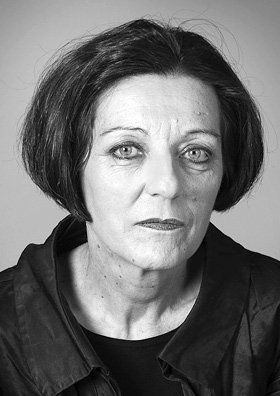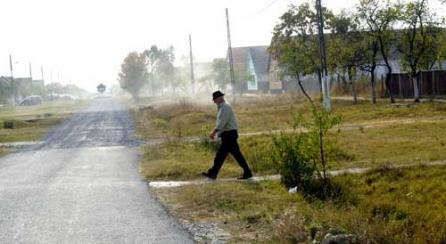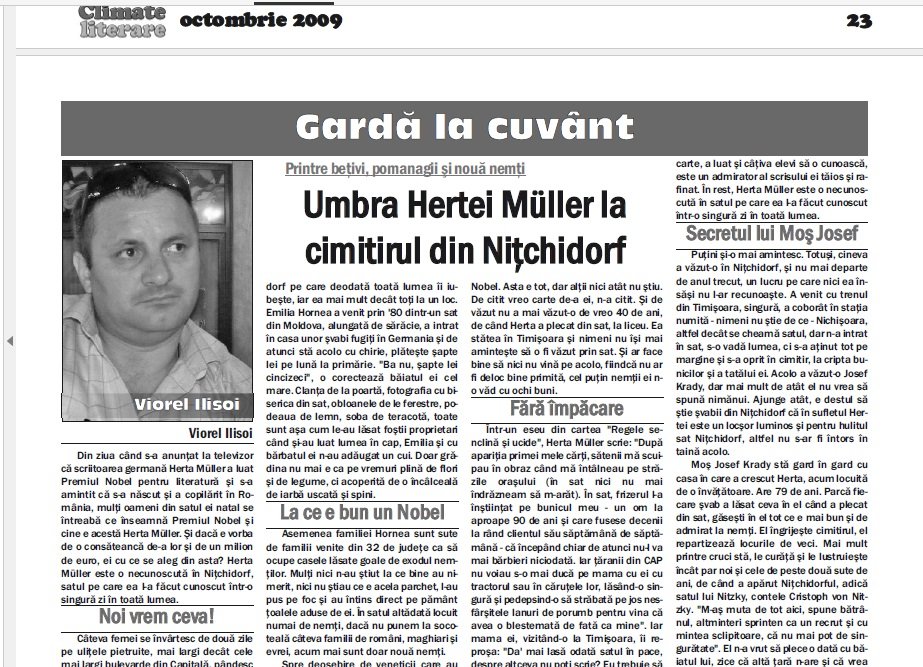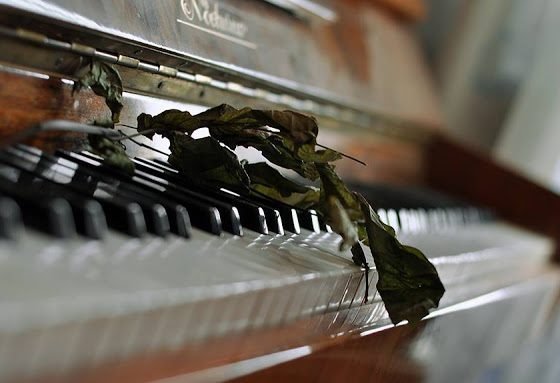
Din ziua când s-a anunțat la televizor că scriitoarea germană Herta Müller a luat premiul Nobel pentru literatură și s-a amintit că s-a născut și a copilărit în România, mulți oameni din satul ei natal se întreabă ce înseamnă premiul Nobel și cine e această Herta Müller. Și dacă e vorba de o consăteancă de-a lor și de un milion de euro, ei cu ce se aleg din asta? Herta Müller este o necunoscută în Nițchidorf, satul pe care ea l-a făcut cunoscut într-o singură zi în toată lumea.
Noi vrem ceva!
Câteva femei se învârt de două zile pe străzile pietruite, mai largi decât cele mai largi bulevarde din Capitală, pândesc când trece vreun străin și-l întreabă dacă e de la Nobel, dacă a adus vreun ban, ceva, să le dea și lor, sătenilor din Nițchidorf, ori poate niște ajutoare, haine, alimente, nu contează, dar să le dea. Străinii nu-s decât ziariști veniți să vadă cu ochii lor satul care nu apare decât pe unele hărți mai detaliate, dar s-a aprins deodată ca un beculeț pe harta literară a lumii, și nu au nimic de dat din partea Hertei, ceea ce le dezamăgește pe femeile ieșite la pomană în uliță și le face să mai ia câte o gură de rachiu, de supărare.
Emilia Hornea, o femeie de vreo 60 de ani, bea de două zile cu vecinele. Stau toate la fântână, în drum, și-i tot laudă pe nemți, care uite ce case au făcut, ce străzi, ce fântâni, școală, biserică, iar acum a ieșit dintre ei și o femeie care a câștigat un milion de euro. De la ei, din Nițchidorf, județul Timiș. Un milion! Herta și nu știu mai cum, cică scrie în cărți. A zis la televizor.
– Uite ce casă am eu de la nemți! se laudă Emilia Hornea; și bate cu pumnul în pereții groși, ca de cetate. Nu mai există pe lume oameni ca nemții!
Îi dau și lacrimile când vorbește de nemții din Nițchidorf, pe care deodată toată lumea îi iubește, iar ea mai mult decât toți la un loc. Emilia Hornea a venit prin ’80 dintr-un sat din Moldova, alungată de sărăcie, a intrat în casa unor șvabi fugiți în Germania și de atunci stă acolo cu chirie, plătește șapte lei pe lună la primărie.
– Șapte cincizeci! – o corectează băiatul ei cel mare.
Clanța de la poartă, lucrată la ciocan, fotografia veche cu biserica din sat, obloanele de lemn de la ferestre, podeaua de lemn, bușteni crăpați în lung, soba de teracotă: toate sunt așa cum le-au lăsat foștii proprietari când și-au luat lumea în cap; Emilia și cu bărbatul ei n-au adăugat un cui. Doar grădina nu mai e ca pe vremuri plină de flori și de legume, ci acoperită de o încâlceală de iarbă uscată și spini.

La ce e bun un Nobel
Asemenea familiei Hornea sunt sute de familii venite din 32 de județe ca să ocupe casele lăsate goale de exodul șvabilor. Mulți nici n-au știut la ce bine au nimerit, nici nu știau ce e acela parchet, l-au pus pe foc și au întins direct pe pământ țoalele aduse de ei. În satul altădată locuit numai de nemți, dacă nu punem la socoteală câteva familii de români, maghiari și evrei, acum nu mai sunt decât nouă nemți.
Spre deosebire de veneticii care au umplut satul, nemții rămași știu toți cine e Herta Müller. Dar nimeni nu vorbește de bine despre consăteanca lor și nici nu așteaptă nimic de la ea.
Dintre toți nemții, numai Anton Kraus încearcă să obțină, indirect și insistent, un beneficiu cât de mărunt din faima bruscă a Hertei Müller. El e un fost ceasornicar căzut acum într-o nesfârșită beție, trăiește dintr-un neînsemnat ajutor de la bugetul local. Premiul Nobel al Hertei îi aduce, de câteva zile, porția zilnică de bere, că altceva nu bea.
– Am fost coleg cu Herta Müller! le șoptește el străinilor, care nu pot fi altceva decât ziariști.
Le cere să-l plimbe cu mașina lor prin sat ca să îl vadă oamenii în compania unor domni. Să-l ducă acasă, să-i care apă. Apoi, după prima sticlă de bere, mărturisește că nu a fost chiar coleg-coleg, adică el era cu patru ani mai mare decât Herta și nu prea s-au întâlnit pe coridoarele școlii. Mai spune că era o fată deșteaptă și că îi plăcea literatura. Pentru încă o bere sau două mai poate adăuga că Herta avea anumite ciudățenii, cum au îndeobște artiștii, și că merită premiul Nobel. Asta e tot, dar alții nici atâta nu știu. De citit vreo carte de-a ei, n-a citit. Și de văzut nu a mai văzut-o de vreo patruzeci de ani, de când Herta a plecat din sat, la liceu. S-a mutat în Timișoara și nimeni nu își mai amintește să o mai fi văzut prin sat. Și ar face bine să nici nu vină pe acolo fiindcă nu ar fi deloc bine primită, cel puțin nemții ei n-o văd cu ochi buni.
Fără împăcare
Într-un eseu din cartea “Regele se-nclină și ucide”, Herta Müller scrie: “După apariția primei mele cărți, sătenii mă scuipau în obraz când mă întâlneau pe străzile orașului (în sat nici nu mai îndrăzneam să m-arăt). În sat, frizerul l-a înștiințat pe bunicul meu – un om la aproape nouăzeci de ani și care fusese decenii la rând clientul său săptămână de săptămână – că începând chiar de atunci nu-l va mai bărbieri niciodată. Iar țăranii din CAP nu voiau s-o mai ducă pe mama cu ei cu tractorul sau în căruțele lor, lăsând-o singură și pedepsind-o să străbată pe jos nesfârșitele lanuri de porumb pentru vina că avea o blestemată de fată ca mine”. Iar mama ei, vizitând-o la Timișoara, îi reproșa: „Da’ mai lasă odată satul în pace, despre altceva nu poți scrie? Eu trebuie să trăiesc acolo, tu nu“.
Acea primă carte a Hertei Müller, “Ținuturile joase”, a marcat ruptura definitivă dintre scriitoare și satul ei natal.
– A spus numai minciuni despre noi în cartea aceea – spune Hildegard Anghelaș, verișoară de-a doua a Hertei Müller. Că șvabii au îmbrațișat cu entuziasm național-socialismul lui Hitler, când de fapt ei au fost obligați să lupte în armata germană. Că erau niște lași. Că tatăl său era un bețiv, dar el nu bea mai mult decât alți oameni, era un om extraordinar, un tată exemplar. Să fie fericită cu premiul ei, poate îl merită, dar să stea acolo. Nu cred că va mai veni vreodată pe aici după câte a scris despre noi, șvabii din Nițchidorf.
Volumul “Ținuturile joase”, poate unicul exemplar din sat, stă aruncat pe undeva prin casă. Hildegard nici nu știe pe unde e. N-a mai citit altă carte de-a verișoarei sale. Nici ceilalți nemți din sat n-au citit. Ei o văd pe Herta Müller la televiziunile nemțești, prin satelit, aud ce spune despre ei și nu au nevoie să mai și citească vreo carte. Și nu pot să o ierte.
Numai profesorul de română Tiberiu Buhnă are cărțile Hertei Müller, el a fost și la Timișoara când ea și-a lansat o carte, a luat și câțiva elevi să o cunoască, este un admirator al scrisului ei tăios și rafinat. În rest, Herta Müller este o necunoscută în satul pe care ea l-a făcut cunoscut într-o singură zi în toată lumea.
Secretul lui moș Josef
Totuși, cineva a văzut-o în Nițchidorf – și nu mai departe de anul trecut, un lucru pe care nici ea însăși nu l-ar recunoaște. A venit cu trenul din Timișoara, singură, a coborât în stația numită – nimeni nu știe de ce – Nichișoara, altfel decât se cheamă satul, dar n-a intrat în sat, s-o vadă lumea, ci s-a aținut tot pe margine și s-a oprit în cimitir, la cripta bunicilor și a tatălui ei. Acolo a văzut-o Josef Krady, dar mai mult de atât el nu vrea să spună nimănui. Ajunge atât, e destul să știe șvabii din Nițchidorf că în sufletul Hertei este un locșor luminos și pentru hulitul sat Nițchidorf, altfel nu s-ar fi întors în taină acolo.
Moș Josef Krady stă gard în gard cu casa în care a crescut Herta, acum locuită de o învățătoare. Are 79 de ani. Parcă fiecare șvab a lăsat ceva în el când a plecat din sat, găsești în el tot ce e mai bun și de admirat la nemți. El îngrijește cimitirul, el repartizează locurile de veci. Mai mult printre cruci stă, le curăță și le lustruiește încât par noi și cele de peste două sute de ani, de când a apărut Nițchidorful, adică satul lui Nitzky, contele Cristoph von Nitzky.
– M-aș muta de tot aici, spune bătrânul, altminteri sprinten ca un recrut și cu mintea sclipitoare, că nu mai pot de singurătate.
N-a vrut să plece odată cu băiatul lui, zice că altă țară n-are și că vrea să moară aici.
Moș Josef n-o condamnă prea tare pe Herta Müller pentru câte a scris ea despre nemții de-acasă. Și el e gură-slobodă și le-a spus-o verde în față românilor și ucrainenilor care au intrat în casele șvabilor că-s niște bețivi, puturoși, niște primitivi, de era să-l snopească veneticii în bătaie, fiindcă nici lor, nici nemților, nimănui nu-i place să i se spună adevărul în față. Pentru moș Iosef, om cu patru clase, dar nemțești, premiul Nobel pentru literatură, dacă se vorbește atâta despre el, nu poate fi decât ceva important. A aflat că îl iau numai marii scriitori ai lumii. Și el e mândru – poate s-or supăra ceilalți șvabi din sat – că din satul lor s-a putut ridica o scriitoare care să ia acest premiu, din Nițchidorf, nu dintr-un sat unde oamenii beau spirt medicinal până cad în șanț. Și asta nu se va mai întâmpla multe sute de ani încolo fiindcă nemții au plecat și Nițchidorful nu mai e cel de altădată, satul unor coloniști care au venit cu învățătorul după ei și întâi și-ntâi au ridicat o școală.
(Jurnalul Național, 12 oct. 2009, Asymetria, 6 martie 2010)
The Shadow of Herta Müller at the Nitzkydorf Cemetery
by Viorel Ilişoi
Translated by Nick Tullius
From the day they announced on television that the German writer Herta Müller received the Nobel Prize for Literature and it was recalled that she was born and raised in Romania, many people in her native village are asking themselves what is the Nobel Prize and who is this Herta Müller? And if she is a villager of theirs and won one million euros, what is in it for them? Herta Müller is an unknown in Nitzkydorf, the village she put on the worldwide map in a single day.
WE WANT SOMETHING!
For two days now, some women are moving about on the paved streets, wider than the widest boulevards in the capital, watching any stranger and asking him if he was from the Nobel, if he brought any money, anything, for them, the villagers of Nitzkydorf, or perhaps some aid, clothing, food, it does not matter what, as long as he has something to give.
The foreigners are only journalists, who came to witness with their own eyes the village that appears only on some of the more detailed maps, but suddenly lit up like a little light bulb on the literary map of the world. And they have nothing to give from Herta. That disappoints the women out on the street, who were hoping for good luck, and makes them take another sip of brandy, to drown their sorrow.
Emilia Hornea, a woman about 60 years old, has been drinking with neighbors for two days. They sit on the street, near the well, and keep praising the Germans, pointing out what they did, what houses, what streets, what wells, schools, churches, and now out of their midst came a woman who won one million euros. From their village, Nitzkydorf, Timis county. One million. Herta what’s her name, supposedly writes books. That’s what they say on television. „Take a look what a home I got from the Germans, boasts Emilia Hornea, pounding her fist into the thick walls, like those of a fortress. There are no people in the world like the Germans”. Tears get into her eyes when speaking of the Germans of Nitzkydorf, whom suddenly everybody loves, and she more than all the others together.
Emilia Hornea came around 1980 from a village in Moldova, driven by poverty, went into the home of some Swabians that had run away to Germany, and since then sits there, paying a rent of seven lei per month at the town hall. „No, it’s seven lei and fifty bani” corrects her eldest son. The handle of the door, the photo of the village church, the shutters on the windows, the wooden floor, the tiled stove, all are as they were left by the former owners when they took off into the world. Emilia and her husband have not added a nail. Only the garden is not like it was in the olden days, full of flowers and vegetables, but is now covered with dry grass and thorns.
WHAT GOOD IS A NOBEL?
Like the Hornea family are hundreds of families that came from 32 counties to occupy homes left empty by the exodus of the Germans. Many never knew how well they hit it, did not know what the parquet floor was, so they burned it and spread their clothes directly on the floor. The village, once inhabited only by the Germans, with a few families of Romanians, Hungarians and Jews, now has only nine Germans.
Unlike newcomers who filled the village, the remaining Germans all know Herta Müller. But nobody speaks well of their past fellow villager, or expects anything from her. Of all the Germans, only Anton Kraus tries to obtain, indirectly but insistently, a small benefit from the sudden fame of Herta Müller. He’s been a watchmaker, now fallen into an endless drunk, living on insignificant help from the village budget. In the last few days, Herta’s Nobel Prize has been bringing him his daily portion of beer, because he does not drink anything else.
„I was a colleague of Herta Müller”, he whispers to foreigners, who cannot be anything other than journalists. He asks them to drive him through the village in their cars, so that people can see him in the company of gentlemen. They take him home and carry his water can.
Then, after the first glass of beer, he admits that he was not even a fellow classmate, that he was actually four years older than Herta, and did not often meet her in the school corridors. He says that she was a clever girl and that she loved literature. For another beer or two, he will add that Herta had some oddities, commonly found with artists, and that she deserves the Nobel Prize.
That’s all, but others do not know even that much. He did not read any book of hers, and has not seen her for about 40 years, ever since Herta left the village to go to high school. She lived in Timisoara and nobody quite remembers to have seen her in the village. And she’d better not come there, because she would not be welcome, at least the Germans would not like to see her.
WITHOUT RECONCILIATION
In an essay in the book „The king bows and kills”, Herta Müller writes: „After the appearance of my books, the villagers spit in my face when I met them on the city streets (in the village I did not even dare to show my face). In the village, the barber told my grandfather – a man almost 90 years old who had been his weekly customer for decades – that effective immediately he will not shave him again. And the peasants did not want to take my mother along in their tractor or in their carts, leaving her to take a punishing walk across the endless fields of corn alone, only because they blamed her for having a cursed girl like me”. And her mother, visiting her in Timisoara, reproached her: “For once, leave the village alone; can’t you write about anything else? I must live there, you do not”.
That first book by Herta Müller, „Nadirs” (Niederungen) marked the final break between the writer and her native village.
„She said only lies about us in that book”, says Hildegard Anghelaş, second cousin of Herta Müller. “That Swabians enthusiastically embraced the national socialism of Hitler, when in fact they were forced to fight in the German army. That they were cowards. That her father was a drunkard, while in fact he did not drink any more than the other people and was an extraordinary man, an exemplary father. Let her be happy with her prize, perhaps she deserves it, but she should stay there. I do not think that she will come here, after what she has written about us, the Swabians of Nitzkydorf”.
She has perhaps the only copy of the book „Nadirs” existing in the village, put somewhere in the house. Hildegard does not know where it is. She never read another book by her cousin. Neither did the other Germans in the village. They see Herta Müller on German television, via satellite; they hear what she has to say, and they cannot forgive her.
Only professor of Romanian language Tiberiu Buhn owns the Herta Müller books, and he went to Timisoara when she launched a book, and took several students along with him to meet her. He is a keen admirer of her cutting and refined writing. Otherwise, Herta Müller is an unknown in the village which she made famous worldwide in a single day.
THE SECRET OF OLD MAN JOSEF
While few still remember her, someone saw her in Nitzkydorf, and as recently as last year, something that perhaps she would not even admit herself. She came by train from Timisoara, alone, got off at the station called – nobody knows why – Niţchişoara, a different name from the village. But she did not enter the village, where people would see her, but walked all along the edge and stopped at the cemetery, at the crypt of her grandparents and her father. There Josef Krady saw her, but more than that he does not want to tell anyone. That is enough for the Swabians of Nitzkydorf to know that in the soul of Herta, there is still a little tender place for the village of Nitzkydorf, otherwise she would not have returned there in secret.
Old man Josef Krady lives fence-to-fence with the house where Herta grew up, which is now inhabited by a teacher. He is 79 years old. It seems as if every Swabian left something with him, when they departed the village; you find in him all that is best and most admirable about the Germans.
He maintains the cemetery and distributes the final resting places. He spends time among the crosses, he cleans and polishes them, so that they look like new, even those over two hundred years old, dating back to the beginnings of Nitzkydorf, meaning the village of Nitzky, count Christoph von Nitzky. „I would move from here”, says the old man, otherwise lithe as a rookie and with a brilliant mind, “because I cannot take the loneliness”. He did not want to go along when his son left, saying that he had no other country and he wants to die here.
Old man Josef is not too hard on Herta Müller for what she wrote about the Germans. And he’s mouth-loose and told the Romanians and Ukrainians who moved into the homes of the Swabians to their faces that they were stinky drunkards, primitives, even if the newcomers would beat him up, because neither they, nor the Germans, nor anyone else would like to be told the naked truth.
For old man Josef, a man with only four school classes, but German ones, the Nobel Prize for literature, if so much is said about it, can only be something important. He found out that it is given only to the great writers of the world, and he is proud that such a writer came from his village, even if the other Swabians in the village should feel offended. From Nitzkydorf, not from a village where people drink medicinal alcohol until they fall into the ditch. And that will not happen again for hundreds of years, because the Germans have gone and Nitzkydorf is no longer what it once was, the village of settlers who came with the teacher behind them and first of all built a school.
[Published at Donauschwaben Villages Helping Hands – 30 Oct 2009]




1 comment
Ei, na, iar acum ne căznim cu goagle transleit să îl punem la loc în română!!!
(Glumesc, dar n-ar strica pentru unii)